Bi-Directional Human-Robot Interactive Task Generation System based on Large Language Models and Behavior Trees
In recent years, generative artificial intelligence and large language model technologies have continued to advance, potentially changing the way robots interact with humans, understand and interpret their environment, and execute complex tasks. Through large language models, robot task generation problems can be formulated in a prompt-based learning paradigm, allowing the generation of task sequences in a zero-shot or few-shot manner. In future human-robot collaborations, where robots and humans work together in unstructured environments to perform complex and non-specific tasks, considering important features such as modularity and responsiveness in robot systems, behavior trees offer a more effective approach for designing complex robot tasks compared to sequential tasks or finite state machines.
Given this context, the problem addressed by this research direction is how to integrate generative artificial intelligence, large language models, and behavior trees to automatically generate robot tasks based on human-described requirements, considering the feasibility and success rate of robot tasks, and validate the generated tasks using physical robots.

